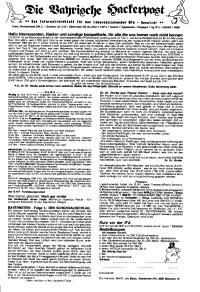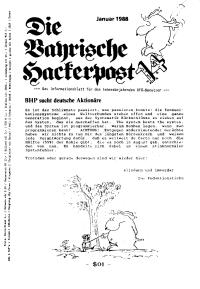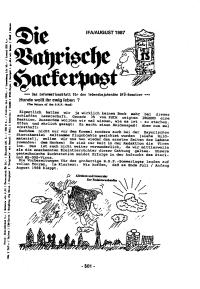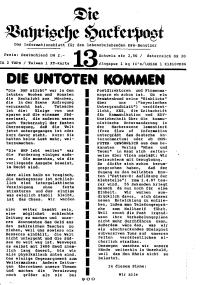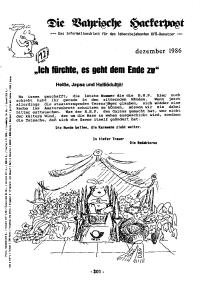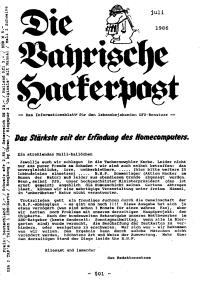Copy Link
Add to Bookmark
Report
Computer Undergroud Digest Vol. 06 Issue 69

Computer underground Digest Sun July 31, 1994 Volume 6 : Issue 69
ISSN 1004-042X
Editors: Jim Thomas and Gordon Meyer (TK0JUT2@NIU.BITNET)
Archivist: Brendan Kehoe
Retiring Shadow Archivist: Stanton McCandlish
Shadow-Archivists: Dan Carosone / Paul Southworth
Ralph Sims / Jyrki Kuoppala
Ian Dickinson
Copper Ionizer: Ephram Shrustleau
CONTENTS, #6.69 (Sun, July 31, 1994)
File 1--Memphis convicts Calif. (Am Action) BBS of "Porn"
File 2--Response to AA BBS Verdict (fwd)
File 3--AP bungles my AA BBS comments :)
File 4--The Internet Reacts to the Am. Action BBS (fwd)
File 5--Some Thoughts on the Amateur Action Verdict
File 6--it's not just computer porn either
Cu-Digest is a weekly electronic journal/newsletter. Subscriptions are
available at no cost electronically.
CuD is available as a Usenet newsgroup: comp.society.cu-digest
Or, to subscribe, send a one-line message: SUB CUDIGEST your name
Send it to LISTSERV@UIUCVMD.BITNET or LISTSERV@VMD.CSO.UIUC.EDU
The editors may be contacted by voice (815-753-0303), fax (815-753-6302)
or U.S. mail at: Jim Thomas, Department of Sociology, NIU, DeKalb, IL
60115, USA.
Issues of CuD can also be found in the Usenet comp.society.cu-digest
news group; on CompuServe in DL0 and DL4 of the IBMBBS SIG, DL1 of
LAWSIG, and DL1 of TELECOM; on GEnie in the PF*NPC RT
libraries and in the VIRUS/SECURITY library; from America Online in
the PC Telecom forum under "computing newsletters;"
On Delphi in the General Discussion database of the Internet SIG;
on RIPCO BBS (312) 528-5020 (and via Ripco on internet);
and on Rune Stone BBS (IIRGWHQ) (203) 832-8441.
CuD is also available via Fidonet File Request from
1:11/70; unlisted nodes and points welcome.
EUROPE: from the ComNet in LUXEMBOURG BBS (++352) 466893;
In ITALY: Bits against the Empire BBS: +39-461-980493
UNITED STATES: etext.archive.umich.edu (141.211.164.18) in /pub/CuD/
ftp.eff.org (192.88.144.4) in /pub/Publications/CuD
aql.gatech.edu (128.61.10.53) in /pub/eff/cud/
world.std.com in /src/wuarchive/doc/EFF/Publications/CuD/
uceng.uc.edu in /pub/wuarchive/doc/EFF/Publications/CuD/
wuarchive.wustl.edu in /doc/EFF/Publications/CuD/
EUROPE: nic.funet.fi in pub/doc/cud/ (Finland)
ftp.warwick.ac.uk in pub/cud/ (United Kingdom)
JAPAN: ftp.glocom.ac.jp /mirror/ftp.eff.org/
COMPUTER UNDERGROUND DIGEST is an open forum dedicated to sharing
information among computerists and to the presentation and debate of
diverse views. CuD material may be reprinted for non-profit as long
as the source is cited. Authors hold a presumptive copyright, and
they should be contacted for reprint permission. It is assumed that
non-personal mail to the moderators may be reprinted unless otherwise
specified. Readers are encouraged to submit reasoned articles
relating to computer culture and communication. Articles are
preferred to short responses. Please avoid quoting previous posts
unless absolutely necessary.
DISCLAIMER: The views represented herein do not necessarily represent
the views of the moderators. Digest contributors assume all
responsibility for ensuring that articles submitted do not
violate copyright protections.
----------------------------------------------------------------------
Date: Sat, 30 July, 1994 22:18:43 CDT
From: CuD Moderators <cudigest@mindvox.phantom.com>
Subject: File 1--Memphis convicts Calif. (Am Action) BBS of "Porn"
((MODERATORS' NOTE: Robert and Carleen Thomas, operators of Amateur
Action BBS in California, were tried and convicted of sending
"pornography" across state lines by a Memphis jury. Relevant case
documents, including the original indictment, can be found in CuDs
#5.33, 5.35, and 5.53. We thank the posters who send over the
following two press reports, which emphasize the sticky problem of
"local standards" applied to the Net)).
Source: Chicago Tribune, July 29. Sect 1, p. 6
COUPLE GUILTY IN SALE OF PORN VIA COMPUTER
A husband and wife were convicted of distributing pornography via
computer Thursday in a case that raised questions about how to apply
federal obscenity law to the information superhighway.
((The story notes that Robert and Carleen Thomas, of Milpitas,
California, were each convicted on 11 counts of transmitting
obscenity over interstate phone lines on the members-only BBS.
They can be sentenced to up to five years in prison on each count and a
$250,000 fine)).
During the weeklong trial, jurors were shown photographs carried
over the Thomases' bulletin board featuring scenes of bestiality and
other sexual fetishes. The images were available, for a fee, to
computer users around the world.
((The story mentions that a postal inspector testified he joined the
Amateur Action BBS under a fake name and received sexually
explicit pictures on his Memphis computer. The defense, says the
story, argued that the prosecutors "shopped around" for a place to
try the case where a "conservative jury might be found")).
"This case would never have gone to trial in California," said
defense attorney Richard Williams, who plans an appeal.
Assistant U.S. Atty. Dan Newsom said the trial was held in Memphis
because pictures carried on the bulletin board were received here.
In this age of international computer networks, the federal trial
raised questions about a 1973 Supreme Court ruling that obscenity must
be judged according to local community standards.
((The story describes the opinion as designed to let local
citizens determine community standards))
"But it may not work anymore," he said from his office in
Washington. Under that standard, federal juries in the most
conservative parts of the country could decide what sexually
explicit images and words get on the information superhighway,
Bates said. Ultimately, the issue will probably wind up back at
the Supreme Court.
==================================================================
Wire story circulating on Usenet:
MEMPHIS, Tenn -- A federal jury convicted a California couple Thursday
of transmitting obscene pictures over a computer bulletin board.
The case has raised questions, in this age of international computer
networks, about a 1973 U.S. Supreme Court ruling that defines
obscenity by local community standards.
"This case would never have gone to trial in California," defense
lawyer Richard Williams said.
Prosecutor Dan Newsom, an assistant U.S. attorney, said the trial was
the first he knows of for computer bulletin board operators charged
under federal law with transmitting pornography featuring sex by
adults.
Robert and Carleen Thomas, both 38, of Milpitas, Calif., were
convicted of transmitting sexually obscene pictures through interstate
phone lines via their members-only Amateur Action Bulletin Board
System.
The Thomases were convicted on 11 criminal counts, each carrying
maximum sentences of five years in prison and $250,000 in fines.
Thomas was acquitted on a charge of accepting child pornography mailed
to him by an undercover postal inspector.
The Thomases refused to comment after the verdict. They remain free on
$20,000 bond to await sentencing, for which no date was set.
Williams said his clients will appeal, arguing the jury was wrongly
instructed on how to apply the Supreme Court's standard on obscenity.
The trial raised questions of how to apply First Amendment free-speech
protections to "cyberspace," the emerging community of millions of
Americans who use computers and modems to share pictures and words on
every imaginable topic.
Williams argued unsuccessfully before trial that prosecutors sought
out a city for the trial where a conservative jury might be found.
During the weeklong trial jurors were shown photographs carried over
the Thomases' bulletin board featuring scenes of bestiality and other
sexual fetishes. Williams argued this was voluntary, private
communication between adults who knew what they were getting by paying
$55 for six months or $99 for a year.
Their conviction also covers videotapes they sent to Memphis via
United Parcel Service. The videotapes were advertised over the
bulletin board.
------------------------------
Date: 28 Jul 1994 22:12:20 -0500
From: karl@MCS.COM (Karl Denninger)
Subject: File 2--Response to AA BBS Verdict (fwd)
In article <118598@cup.portal.com>,
H Keith Henson <hkhenson@cup.portal.com> wrote:
>CNN this noon had a report that the Thomas' were found guilty. As I
>understand it, not on all charges. Will get the results and post them
>as soon as I can get the data. Keith
Correct.
They were found guilty of 11 counts, each carrying a 10 year jail term
and a $250,000 fine!
That's 2.5 MILLION dollars and 110 years! Even with time off for good
behavior and all, if this case stands they're both finished and, IMHO,
so is much of the erotica available on the net in the US for those
sites which are interstate.
The *only* count which they got off on was the kiddie porn charge.
This is a serious case folks. We're going to be talking to the
lawyers IMMEDIATELY here, as the ramifications of this may be that we
can no longer sell accounts to users across state or even local
boundary lines -- or we may have to drop all the erotic material on
the net!
Within Chicago what is on the net wouldn't violate community
standards, especially given what I can rent at the local video store
(I live and work in the middle of Lakeview, which is known to some as
"boys town". Draw your own conclusions.) :-) In Memphis, on the other
hand.......
NETCOM in particular is in bad shape on something like this, what with
their presence nationally......
NOT good. Very, very not good.
And some of you thought Copyright was a problem? Try *this* on for
size!
------------------------------
Date: Sun, 31 Jul 1994 19:02:26 GMT
From: entropy@world.std.com (Lawrence Foard)
Subject: File 3--AP bungles my AA BBS comments :)
The AP wire finally arrived on world. I wish they would e-mail for
clarification before releasing them, in one place they have me as an
anonymous person from Boston, another place as a person from Brookline Ma,
who runs a BBS :)
I was going to be running an internet POP for someone, but decided not
to because of this, I don't presently have a BBS.
Unfortunitly it also failed to bring up the reason for the concerns.
The reasons why this is a concern:
1) A BBS operator in any area of the country now must limit the
contents of the BBS to that which is acceptable in the most backward
area of the country.
This makes BBS operators answerable to officials which they had no
say in electing, and laws which they have no say in through the
democratic process. If BBS operators are to be held to the laws of all
towns and states at the very least they should be allowed to vote in all
of them. (no out of state sales tax...)
Its completely impractical, something which appears totally harmless one
place might be illegal someplace else. Lets say that the use of an
electro-ejaculator (sp?) for getting semen from bulls is discussed on
a farm BBS. In another state this could be painted as sex with an animal,
and a farmers story of doing this might be enough to land him in jail.
2) The operator of the BBS didn't cause pornography to cross state lines,
the user in Tenn paid for the phone call and entered the commands which
caused it to cross state lines. The user should be responsible. Because
an electronic connection could cross several networks, there is no hope
of being able to know where the end user is. Even with caller ID its
possible that the person is using a local dialout from a long distance
data carrier. On the internet its even more difficult since someone
can easily cross several machines in many states or countries.
3) There is no precedent at this time (that I'm aware of) protecting
an internet provider. Unlike a BBS operator internet providers cannot
control the content of what users acquire through the net. While it
can be hoped that this lack of control will provide protection, there
is no guarantee that it will (Mike?). A person could download every bit of
pornography available anywhere in the world, and then turn around
and charge the internet provider with 1000's of counts, amounting to
1000's of years in jail. To provide internet access at this time is
effectively playing russian roulette, if you lose you might as well
be dead.
4) In the case of really illegal porn, kiddy porn etc. where children are
exploited to make it, action should be taken against those and only those
who upload/post it in the first place, it is impossible for anyone else
on the internet to prevent the transmission of data. The volume of data
traveling on the net is beyond the ability of any one human, or even
dozens to filter through.
In the case of kiddy porn the only responsibility of sysops should be to
provide log file etc. to law enforcement, so that they can trace it to
the source and hopefully ultimately catch those who made it. In other
words internet providers should be treated the same way a long distance
phone carrier is, since neither can or should regulate the content of
the data they carry.
5) The standards by which something is judged to be obscene are absurd,
the first amendment says nothing about making exceptions for material
which some may find offensive. I think many religious broadcasts could
easily be found offensive by the standards of the Castro area
in SF, why can't Pat Robertson go to jail in CA for transmitting
obscene material (by local standards) into the Castro?
Current obscenity laws violate the freedom of speech and the freedom of/
from religion because they only consider things offensive to certain
Christian sects to be obscene.
Kiddy porn is wrong because children are hurt when it is made, but I
can see no rational reason why any pictures/stories/info of any sort
made by consenting parties should be restricted.
I hope the supreme court will one day realize the absurdity of
this loophole.
AP reporters:
Please feel free to use any of this, but if there is anything that
you have the least doubt about please e-mail or post questions
instead of publishing incorrect or incomplete info.
------ Call the skeptic hotline 1-900-666-5555 talk to your own personal .
\ / skeptic 24 hours/day. Just say no to victimless crimes. . .
\ / High quality Linux application development available. . . .
\/ Violence is a lousy substitute for sex and drugs. . . . .
------------------------------
Date: Sun, 31 Jul 1994 16:12:55 PDT
From: Anonymous <cudigest@mindvox.phantom.com>
Subject: File 4--The Internet Reacts to the Am. Action BBS (fwd)
**Here's the summary of an AP wire story for CuD readers**
Hours after a couple was convicted of sending images of bestiality
and sexual fetishes over a computer bulletin board, the Internet was
humming with warnings and protests.
"If this case stands, you can bet there will be a hell of a lot
more prosecutions on the same basis in extremely short order," Karl
Denninger of Chicago wrote Friday on the computer network.
((The story summarizes the case))
Even an 8.0 earthquake shaking the entire U.S. would do less damage
to Internet than the ruling, a Boston user wrote in an anonymous
message.
Many users wondered on-line about what the 1973 Supreme Court rule
allowing local communities to define obscenity means in cyberspace.
((The story notes that some people say the decision is inapplicable))
"This case. . .has one community attempting to dictate standards
for the whole country," wrote Mike Godwin, a lawyer for the Electronic
Frontier Foundation, a think tank in Washington.
One man said he planned to end the bulletin board he produces for a
fee because the ruling makes it the legal equivalent of playing
Russian roulette.
"I'm pulling out of it as of now, and believe me I need the money.
...but it would be safer to rob a bank. I might get out of jail before
I'm 140 years old," wrote Lawrence Foard from Brookline, Mass.
((The story notes that BBSes are usually small scale businesses
or hobbys carried on a larger system like the internet, which is
a factual error, but what the hey.))
Although most are free, some sexually oriented ones require a fee
paid by credit card to attempt to screen out users under 18.
((More case summary))
The case bodes ill for any American computer system that carries
any sexually related material at all, many users said.
------------------------------
Date: Sat, 30 Jul 1994 23:22:08 PDT
From: Jim Thomas <jthomas@well.sf.ca.us>
Subject: File 5--Some Thoughts on the Amateur Action Verdict
Some readers might wonder why they should care about a decision that
would seem to be simply an "open-and-shut" pornography case. We'll try
to provide a few reasons.
Robert and Carleen Thomas operated Amateur Action, an adult BBS in
Milpitas, Calif. In Memphis, Tenn., Federal court this past week, a
jury found them each guilty of transporting pornography by telephone
across state lines. Robert Thomas was also charged with, but acquitted
of, accepting child pornography sent to him by postal inspector David
H. Dirmeyer (CuD coverage of the case can be found in CuD 6.09, 6.33,
6.35, 6.37, 6.43, 6.53, and 6.67). The handling of the case by the
postal inspectors raised issues ranging from entrapment to "possible
court fraud" (CuD 6.43), all worthy of discussion. However, what sets
this case apart from any other is the fact that a citizen in one state
was found guilty in another for actions that were not illegal in the
first state.
Amateur Action BBS was a members-only BBS accessible by telephone from
anywhere in the world. It is a dial-in BBS, and not accessible from
the Net. Callers were screened, paid a fee to join, and knowingly and
willingly accessed the services of the board. By all accounts,
callers were systematically screened to assure that no minors would be
given access. The board specialized in providing graphic sexual
images for all tastes. Some, perhaps most, people would find the
extreme examples of the GIF files and other material, as well as their
ASCII descriptions, repulsive. Repulsiveness, however, is not itself
a crime, and in an earlier California legal dispute, the contents of
the BBS were found not to be in violation of California law. Such
images were, however, in violation of Tennessee law. Transportation
of the images across state lines from California into Tennessee comes
under Federal statutes, and the Thomases were therefore prosecuted on
Federal Charges (See CuD 6.53 for the indictment). This is not simply
"just another porn case," in which the alleged offenders took risks
and lost. The case represents a means by which an act that does not
violate the community standards in one jurisdiction can still be a
criminal offense in another that has different standards. In the
medium of cyberspace, this poses serious consequences. Here are a few
reasons why:
THE COMMUNITY CONCEPT: The U.S. Supreme Court established in Miller
v. California that local communities may determine for themselves the
standards by which a given work could be judged as obscene. In
delivering The Court's opinion, Chief Justice Warren Burger wrote:
Under a National Constitution, fundamental First Amendment
limitations on the powers of the States do not vary from
community to community, but this does not mean that there are, or
should or can be, fixed, uniform national standards of precisely
what appeals to the "prurient interest" or is "patently
offensive." These are essentially questions of fact, and our
Nation is simply too big and too diverse for this Court to
reasonably expect that such standards could be articulated for
all 50 States in a single formulation, even assuming the
prerequisite consensus exists.
......
It is neither realistic nor constitutionally sound to read the
First Amendment as requiring that the people of Maine or
Mississippi accept public depiction of conduct found tolerable
in Las Vegas, or New York City.
Miller functioned in part to allow The Court to avoid the thorny issue
of defining obscenity. It also made it clear that communities could
decide for themselves, within reason, the definition and application
of standards. By this principle, The Court provided the means by which
citizens in Memphis could follow a narrower standard than, say,
citizens in California. Yet, the Memphis decision seems to violate
this principle by imposing the standards of Tennessee on others
outside of the jurisdiction.
The news accounts of the conviction are consistent, and if consistency
suggests accuracy, then it appears that the convictions in this case
were solely because the contents of a BBS in California, which were
legal in that state, were ACCESSIBLE from Tennessee. The Thomases did
not physically transport their files, either personally or through an
intermediary, into Tennessee. They merely made the means available so
that someone FROM Tennessee could obtain them. This seems analogous
to a person in State A, in which alcohol or cigarettes were
prohibited, driving into State B, where they were legal, to obtain
them, and then prosecuting on Federal charges the purveyor of the
commodities in State B for making them accessible to people in State
A. The nature of electronic communications makes this a less than
perfect analogy, but the central point holds: A Tennessee resident
must physically perform the acts to access an out-state source in
order to obtain commodities and return them to the state in which the
commodities were illegal. By this logic, "community standards" can be
extended to, and enforced upon, communities with different standards.
This seems to violate both the letter and spirit of the Miller
decision.
CYBERSPACE AS COMMUNITY: Another complex issue emerges. The concept
of "community" as used in the Miller decision, denotes a geographical
entity circumscribed by physical boundaries. Electronic communication
challenges this. The concept of "cyberspace" suggests a broader
definition, one that can co-exist within the more limited geographic
conception, while retaining separate status because of its unique
characteristics. A broader conception is not without precedent,
because it has long been recognized by social scientists.
By now, most of us realize that "cyberspace" is not a specific
geographic or spatial location. Cyberspace is a metaphor for something
that happens when we communicate with others by means of a personal
computer and a modem. As we sit at the computer keyboard and magically
etch our ASCII or gif mark for others to see, we feel as if we leave
it somewhere, and that "somewhere" is simply a conceptually metaphoric
way of identifying the experience of electronic communication.
Cyberspace includes a variety of computer/modem mediated
communication, ranging from Bulletin Board Systems (BBSes), Internet
electronic mail, public access systems where people meet, shop, fall
in and out of love, or carouse, electronic discussion groups (such as
Usenet or the Bitnet hotlines), and real-time interaction, such as
on-line "chat/talk" or IRC (Inter-relay chat), which allows
simultaneous real-time interaction between numerous people.
Because of the collective and social nature of much electronic
interaction, a derivative metaphor, that of community, emerges. A
community is simply a collection of people self-consciously
co-existing within some identifiable boundary, be it physical (such as
a city or a "community of nations"), normative (such as a "community
of scholars") or ideological (such as an "invisible community" of
anti-flouride activists). Communities create ways for sharing
sufficient cultural expectations to bind participants into a minimal
culture with shared norms and and give a means of access, entry, and
exist. They provide criteria that provide a minimal identity,
establish entry/exit routines, and include a means for distinguishing
"insiders" from "outsiders." Cyberspace does all of this and more. As
a consequence, cyberspace fits the existing definition of community
long used by social scientists. Therefore, it's not unreasonable to
begin pushing the conception of "community" beyond the limations
imposed by, for example, the U.S. Supreme Court.
Alleged undesirable acts of cyber-citizens do not "pollute" a
geographic area with streetwalkers, porn-shops, drive-by shootings, or
other immediate manifestations of the disapproved behavior. Behaviors
exist in symbolic form only, in ASCII or in visual images, and
although freely accessible, they are accessible only to those who
consciously choose to access the symbols. Nasty words and pictures can
even be accessed by the good folk of Memphis, Tennessee. If they
choose. The citizens of a community with narrow views of propriety
can access electronic media as easily as they can can traverse
Interstate 80. Interstate 80, paid for by taxpayers, will take those
good folk directly into San Francisco's North Beach, where they can
watch "nekkid girls" and purchase merchandise to satisfy the wildest
prurient interests. Granted, telephone lines are a bit easier to
navigate than the interstate, but the point's the same: Using an
established public infrastructure, whether highways or telephone lines,
it's no problem to procure commodities that are licit in one community
and physically transport them or their images back home.
To recognize "cyberspace" as a distinct entity satisfying the criteria
of "community" is hardly a novel or radical view. As a community,
cyberspace needn't be homogenous (few communities are), peaceful (few
communities are), or centrally governed (many communities are not). It
need only satisfy the operational definition of "community" (which it
does).
There are likely those who would reject the notion of "cyberspace as
community," falling back on the geographical criterion. But,
"geography," too, is an arbitrary criterion, and one that has
historically changed as new conceptions of identity and common
interests have changed. The necessity of considering "cyberspace as
community" is simply this: The concept of community is as much
normative and symbolic as it is physical. To limit, for example,
"community standards" to a narrow geographic locale when that locale
exists as part of a larger community resembles the Church's
proscriptions of Galilean thinking in the face of a dramatically
changing society. The laws of Tennessee may be fully appropriate for
the citizens of Tennessee, but they may not be shared by those who
congregate in the community of cyberspace.
JURISDICTION: What counts as a community is important because it
frames the extent of jurisdiction and how norms and laws will be
enforced, by whom, and upon whom. If cyberspace is a community, then
the question of jurisdiction becomes imperative. Should policing be
done by the citizens themselves (who have done a reasonably good job
so are)? Should it be done by local geographic communities with power
to regulate what their local citizens may or may not access in other
areas? Should it be done by a centralized national or international
authority? The Memphis decision seems to indicate that at least one
geographic community believes that it should have the power to police
at the local level what occurs globally: If citizens can access
unacceptable symbols from a remote source, then that source should be
shut down. The implications are serious. Some observers have argued
that they cannot be too excited about a bunch of "smut dealers" being
put out of business. But, these "smut dealers" were doing nothing
illegal within their own jurisdiction.
The principle of the decision extends beyond "smut." If, for example,
it is lawful to post "anarchy files," radical policital literature, or
extreme viewpoints or criticisms in one jurisdiction but not in
another, then the danger exists that what is defined as illegal any
where becomes illegal everywhere if it can be accessed electronically.
The Miller decision was explicit in allowing local standards to govern
local enforcement. But, it seems equally explicit in permitting or
tolerating materials if those materials did not violate local
standards. The Memphis decision not only challenged the community
concept, but seemed to turn Miller on its head by saying that the
lowest common denominator could become the universal standard of
exception. And this is why we judge the case of crucial importance to
all who use electronic media. What is legal in California and
elsewhere now is subject to criminal prosecution.
WHAT'S AT STAKE: Because the Memphis decision was a jury verdict and
did not result in precedent-setting legal interpretation, the
immediate impact may seem limited. But, if the case outcome stands and
becomes a model for prosecuting undesirable materials elsewhere, the
consequences are severe. If unchallenged, the decision means that
prosecutors who see their mission as moral entrepreneurs can bring
criminal charges in one jurisdiction against those who violate narrow
community standards. For that reason, we see this is a free speech
issue. The potential chilling effect resulting from similar cases
could severely limit the availability controversial materials or
reduce access to forums for discussion and dissemination of ideas.
Sysops and sysads cannot possibly know the laws of all jurisdictions
in which users of theirs systems reside. If fear of prosecution
results in the closing of BBSes, in restriction of users based on
geography, in restriction of files or discussions, in elimination of
controversial Usenet news groups, or otherwise stifles freedom of
expression, it will not be a blow simply for the cyber community. It
will be a devastating blow for Freedom of Speech in society as well.
------------------------------
Date: Sat, 16 Jul 1994 11:53:14 -0700
From: haynes@CATS.UCSC.EDU(Jim Haynes)
Subject: File 6--it's not just computer porn either
Item in today's paper "800 purveyor faces obscenity charge" says a
California-based sex-talk purveyor is to stand trial in Alabama next
week on obscenity charges.
"We have taken a vigorous stance in enforcing the anti-obscenity law,"
said Assistant Attorney General Bruce Lieberman of Evans' special
investigations division. The newspaper seems to have severely
truncated the story, as "Evans" is never identified. The dateline is
Montgomery, Ala. Says the defendant is Mark Carriere of Los Angeles,
operator of "Mark III Entertainment"
------------------------------
End of Computer Underground Digest #6.69
************************************











